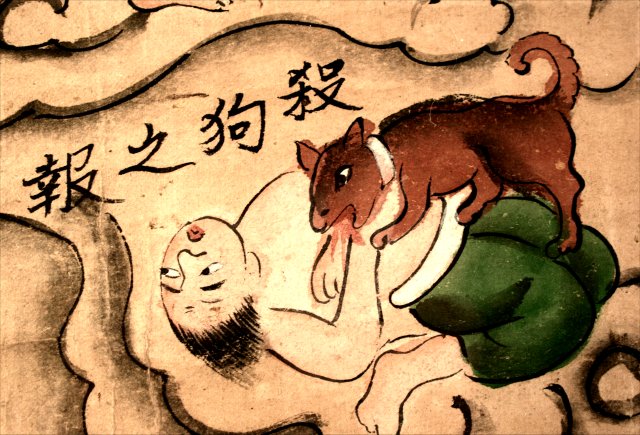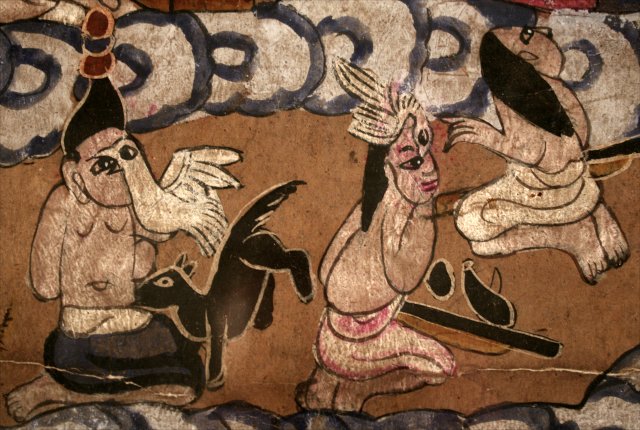
Translation
Recompense for killing dogs
For a description of hell's "steel dogs" from a Taiwanese spiritual medium who had engaged in a series of hell tours between 1976 and 1979, see Voyages to hell, Chapter 26.
Rarely can one identify a common theme in each hell scroll, but here many of the identified crimes cluster around the theme of animal mistreatment, including the eating of meat. Yet many Buddhists in history were not vegetarians, and in places such as Tibet, vegetarianism is almost not an option. Thus this idea of "meat is murder" became modified to the state of mind one brought to the killing of animals. For example, where wolves had to be eradicated, they might be penned within a high-walled enclosure, leaving the community to heave rocks over the wall to kill the wolves. No individual knew whose rock actually killed the wolf in the same way that, in a Western firing squad, no one knows whose bullet killed the target. In Buddhist monasteries, death rituals were sometimes carried out whenever mouse traps were set.
If one did not have the proper state of mind when killing an animal, the hellish consequences could be dire, or as Donald Lopez describes it:
Those who have killed birds without remorse find themselves in a pit filled with a mixture of excrement and molten copper. Having no form of sustenance, they are forced to eat it. But the excrement is filled with maggots that, once inside the body, consume it from the inside until nothing remains. The lifetime in this hell is described as follows: "If fifty human years were a day, and thirty of these were a month, and twelve of those were a year, then five hundred of those years would be one day in this hell, and one would live five hundred years of such days."
In this idea system, animals are people, too, in a rather literal way. That is, the standard of existence in this version of Buddhiam is human, meaning that good humans can be rewarded by becoming a god-like being for a while (in the Indian version of rebirth) and bad humans can be punished by becoming animals (or worse) for a while. They eventually return to the human state -- the only state that knows both good and bad simultaneously -- when their rewards or punishments expire, and in fact only humans are able to become a buddha or enter Nirvana.
Wolfram Eberhard contends that this Buddhist perspective potentially colors the general attitude toward animals:
[A]nimals are essentially human beings who in this form are receiving punishment for former sins. We read that slaughtered or tortured animals often appear in the hells and try to complain against such unjust treatment -- an attempt that is rarely successful. Because animals have human souls it is strictly prohibited by Buddhist law to kill them, because it would be basically the same as killing a human being. But the mistreatment of an animal apparently does not constitute an evil act, because the animal is a human being, punished for bad acts, and suffering in animal form is its fate. Thus, cruel treatment of animals has been quite common in China, and our books do not contain special laws against it.

A second example of a dog (and bird) attack from another hell scroll (S4).